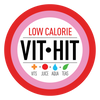Oftentimes, people forget that fuelling your body for exercise with the correct mix of macronutrients has huge implications on performance.
It can be hard to stay on top of everything; drinking enough water, eating fruits and vegetables everyday, getting enough Vitamin D and now we are being told we need to tailor our diets to reap the benefits of exercise? Madness!
Fear not VITHIT friends, as we have devised a quick guide to help you smash your goals and perform your best.
Firstly, it is important to remember that the amount of energy used by an individual during exercise depends on the type of exercise, the duration of the exercise and the fitness level and nutritional status of the individual.
It is also imperative that each person contains a nice mix of macronutrients - carbohydrates, fats and proteins within their diet.
1. Carbohydrates - Your friend, not your enemy:
Within the sports community, particularly amongst individuals that have a personal goal to build muscle, carbohydrates can often get forgotten about. This trend has in fact transcended largely as a result of misconceptions created in the media surrounding the consumption of carbohydrates.
Unfortunately, what many people are unaware of, is that carbohydrates are a fantastic source of energy especially for high intensity sports.
Carbohydrates can be divided into predominantly two groups; starchy carbohydrates and sugars (simple carbohydrates). As with most nutrients it is important to consume a mix of carbohydrates in the diet, with carbohydrates accounting for 60-70% of all calories that are consumed.
Carbohydrates are especially important because after consumption they are stored in the body as glycogen, whilst one is exercising this glycogen is broken down into glucose.
It is this glucose that supplies the muscle with energy.
Glycogen cannot be stored within the muscle and liver for long periods of time, so it is therefore incredibly important that carbohydrates are replenished throughout the day.
It is also hugely important that carbohydrates are consumed after a training session/match to ensure that glycogen stores are adequately replenished. The most effective time to do this is 2 hours after exercise.
For sports which require high levels of energy exertion, such as sprinting or playing a match for periods greater than 60 minutes, it is important that enough carbohydrates are consumed to ensure the body has a good store of glycogen. The majority of carbohydrates that an individual should consume should come from starchy carbohydrates such as bread, potatoes, breakfast cereals and root vegetables.
PRO TIP: Less of an emphasis should be placed on consumption of sugary carbohydrates. These include; sweets, desserts, cakes and jams.
2. Protein - The Muscle Man
Protein plays an important role in helping to strengthen and repair muscle tissue post exercise.
Contrary to popular belief, more protein is not necessarily better. The more carbohydrates and fats an individual consumes in their diet, the less protein an individual will use for energy.
This means that more protein can in fact go towards building and maintaining lean muscle mass. Should an individual consume more protein than say carbohydrates, a lot of this protein will be used for energy rather than for muscle repair and synthesis. Therefore, it is vital that athletes consume a mix of macronutrients.
Muscle growth can only happen when exercise and nutrition work together. There are a few simple ways that athletes can improve this. For example; consuming a protein rich meal - eggs, greek yoghurt or lean meat in the two hours after exercise can increase the rate of muscle repair and growth.
Protein should account for 10-15% of the total calories in an individual's diet. It is important to also remember that it is possible to get enough protein from your diet. Protein powders and supplements are a great way of consuming protein whilst on the go, or when you are in a rush, but always remember that protein from food is just as good a source.
3. Fats - They’re Not All Bad
Energy from fats in the diet should make up the remainder of total calories after you have calculated how much protein and carbohydrate you want to consume.
PRO TIP: Fat is burned during low - medium intensity exercise such as swimming or jogging.
Foods that are high in fats include butter, oils, fried foods, full fat dairy spreads and confectionery. The less fat one consumes the more room there is to increase the amount of carbohydrate in the diet.
Fat, although labelled as the poster child for weight gain, has important functions within the body. It is important that we consume enough fat to provide the body with essential fatty acids required for normal bodily and cellular functioning.
Instead of consuming spreads and processed foods high in fat, look for good fats such as olive/sunflower based spreads and fats that come from oily fish like cod, salmon and tuna.
4. Hydration - Not Macro, But Just As Important
Consuming enough fluids pre, during and post exercise is crucial for optimal performance during exercise. Try to drink at least 2 litres of water a day.
Sick of water? Add a Boost to your post exercise regime to replenish your body and incorporate some Vitamins into your diet.
Disclaimer: As always please consult your doctor prior to starting a new dietary regime or if you have any questions.









